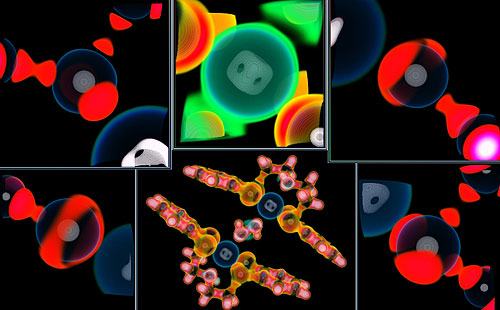 by Preston MacDougall January 29, 2008
For instance, if I was harping incessantly about my desire for a Rat Patrol lunch box, all the while clutching my Speed Racer lunch box, she might have said calmly "An empty can makes a lot of noise." I would voluntarily go to my room and try to figure out what that meant. She got the job done. When she told me that she needed a so-and-so like she needed a hole in her head, I got the message but not the meaning. I could visualize, and even experiment with the sounds made by a can with one stone in it, versus one filled with sand. But I was a sheltered child and I couldn't imagine having a hole in your head.  Credit: P. J. MacDougall and C. E. Henze
I saw the clip last September on YouTube, and if I had to guess which network carried The View, I would have incorrectly said FOX. That's because one week earlier, after President Bush gave his nationally televised address on the state of the war in Iraq, and all the other networks were introducing the Democratic response of Senator Mark Reed, Fox news commentator Shepard Smith ((who has the same kind of hole as Sherri's, but a different spelling of their shared name) ) told viewers "Right now, back to your local FOX programming." Doh! The latest "FOX hole" has infuriated supporters of Ron Paul in particular, but should ring alarm bells across the political spectrum. Prior to the New Hampshire primary, FOX News hosted a televised debate among Republican candidates, but there was a hole on the stage that had been filled one day earlier during the ABC televised debate. Even though Ron Paul had double-digit results in the Iowa caucuses, and would end up with almost that result in New Hampshire, he was uninvited from participating in FOX's Granite State debate. Fred Thompson participated in the debate, but barely made a blip in the poll results. This was such a blatant omission that the Republican Party in New Hampshire officially withdrew its support of the FOX debate. Aside from the "hole in the head" business, one can only speculate on the reasons for this decision. Perhaps they had an idea what he would say during the ABC debate, and wanted to shelter the FOX audience from hearing it. In case you missed it, here's what he said: "We ought to treat others as we would want others to treat us, and we don't treat others so fairly... If they don't listen to us, we bomb them; if they listen to us, we give them money, and it's bankrupting this country because we don't live up to our principles." There was a different kind of "fox hole" in the background to the 2007 Nobel Prize in Chemistry. The recipient, Gerhard Ertl, who has done exquisite experiments on the chemical processes that occur on surfaces, did his work at the Fritz-Haber-Institut in Berlin. The chemist who was the namesake of this institute has an asterisk beside his own Nobel Prize, which was awarded in 1918 for his role in the discovery of a high-yield, iron-catalyzed method to "fix" the nitrogen in the air, forming ammonia, which then can easily be converted to compounds of great industrial, military and agricultural importance. Ammonia isn't the reason for the asterisk, however. Chlorine is. Although outlawed by the "Hague Agreement About the Regulation of Land War", Fritz Haber felt that use of poison gas would rapidly bring about an end to the trench warfare that characterized the First World War, and in Germany's favor. He directed his War Ministry laboratory in the synthesis of weaponry based on chlorine and other poisonous gases, which were first used against Canadian soldiers in the trenches and fox holes during the Second Battle of Ypres in 1915. The Allies won the battle, and the war, and Haber returned to civilian research, rebuilding his reputation and catalyzing a resurgence of German chemical science. This brings me to a mixed metaphor. The Wall Street Journal has long been a formidable force on the frontlines of economic and political journalism. I enjoy reading it because of the excellent writing and the lack of noise. One can only hope that there are no shades of Ypres in the recent decision of the Bancroft family to sell controlling interest of Dow Jones to FOX Network patriarch Rupert Murdoch. Chlorine and the First Amendment do not mix.
On the Web:
E-mail your letters & opinions to editor@sitnews.us SitNews ©2007 Stories In The News Ketchikan, Alaska |